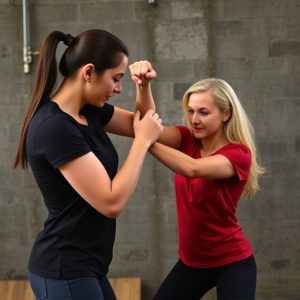Empower Yourself: Essential Self-Defense Tips for Women’s Safety
Self-defense for women is about integrating a combination of physical techniques, psychological resi…….
Self-defense for women is about integrating a combination of physical techniques, psychological resilience, and heightened situational awareness into daily life to enhance personal safety. Key strategies include learning to safely escape dangerous situations, using loud noise distractions, targeting vulnerable points on an attacker, and maintaining confident body language and mindful surroundings awareness. Specialized training programs designed for women, often led by experts, provide realistic drills and scenarios that build readiness and confidence. It's crucial to stay informed on personal safety advice, remain mentally clear under pressure, and consistently practice self-defense skills to ensure they become instinctive. Additionally, utilizing protective devices like pepper spray and personal alarms can act as effective deterrents. Soft skills such as assertiveness and situational awareness are equally important for avoiding confrontations and deterring potential attackers. By combining these approaches, women can significantly improve their ability to protect themselves in unpredictable situations, fostering a greater sense of empowerment and resilience.
When it comes to personal safety, women’s self-defense is a crucial aspect of empowerment and security. This article delves into the essential strategies and techniques that every woman should know. We’ll explore the landscape of self-defense for women, offering practical tips and advice tailored to enhance one’s sense of security and confidence in potentially threatening situations. From understanding the broader context of self-defense to learning specific techniques and tools, this guide is designed to equip readers with actionable knowledge for their safety and well-being.
Understanding Self-Defense for Women: A Comprehensive Overview
Self-defense for women encompasses a range of physical techniques, psychological strategies, and situational awareness skills designed to empower individuals with the knowledge and abilities to protect themselves in potentially harmful situations. A key aspect of effective self-defense is understanding one’s own strengths and limitations, as well as recognizing danger signs before they escalate. It involves learning to move out of harm’s way, make a loud noise to draw attention, or employ strikes and defenses that target vital areas to incapacitate an assailant.
Incorporating self-defense into daily routines can be as simple as practicing awareness of one’s surroundings, maintaining a confident posture, and understanding how to react with decisive action should the need arise. Women are encouraged to seek out specialized training programs that cater specifically to their needs, often taught by instructors with expertise in self-defense for women. These programs typically include drills and scenarios designed to simulate real-life attacks, fostering a sense of preparedness and confidence. Additionally, staying informed about personal safety tips and maintaining a clear head during stressful situations are crucial components of a comprehensive self-defense strategy. Regular practice and mindset development are essential to ensure these skills become second nature when they matter most.
Key Strategies for Personal Safety and Empowerment
Women’s personal safety and empowerment are paramount in a world where threats can arise unexpectedly. To enhance one’s ability to protect themselves, it’s crucial to adopt a comprehensive approach that includes both proactive measures and immediate responses in the face of danger. Key strategies for self-defense for women involve situational awareness, which means being vigilant about your surroundings and any potential threats. This includes recognizing high-risk situations, such as poorly lit areas or unfamiliar environments, and actively avoiding them when possible. Additionally, learning how to react effectively in case of an attack is essential. Self-defense training that focuses on strikes, kicks, and self-defense techniques can equip women with the skills needed to defend themselves physically.
Furthermore, personal empowerment through self-defense extends beyond physical techniques. It encompasses building confidence in one’s abilities and understanding one’s rights and legal options. Self-defense for women also includes verbal assertiveness; being able to confidently articulate boundaries and dissuade potential aggressors with a strong, clear voice can be as effective as physical force. Strategies such as personal alarms, self-defense products like pepper spray, and mobile safety apps are valuable tools that complement the physical aspects of self-defense. By integrating these strategies into daily life, women can significantly enhance their personal safety and sense of empowerment, ensuring they are prepared to navigate potentially threatening situations with greater assurance and resilience.
Practical Techniques and Tools for Effective Self Defense
Women’s self-defense encompasses a variety of practical techniques and tools designed to enhance personal safety. When it comes to physical self-defense techniques, prioritizing simple and effective maneuvers is key. Basic self-defense for women tips often include learning to strike with strength from vulnerable points, such as the eyes, nose, throat, groin, and knees. Aiming to create space between oneself and an attacker can be crucial in a confrontation. Learning how to fall safely to avoid injury is also a valuable skill. Additionally, understanding one’s environment and identifying potential escape routes can significantly improve response times during an emergency.
In terms of tools, personal safety devices such as pepper spray and personal alarms are widely recognized for their effectiveness in deterring attackers. These non-lethal self-defense items are compact and easy to carry, allowing for immediate deployment when needed. It’s also advisable for women to consider self-defense keychains or personal security gadgets that can be used as a deterrent. Beyond physical tools, self-defense for women tips often emphasize the importance of situational awareness, assertiveness training, and self-confidence. These soft skills are equally important as they contribute to an individual’s ability to avoid confrontations and project a formidable presence that may discourage potential assailants. Regular practice and staying informed about personal safety best practices are essential for maintaining proficiency in self-defense strategies.


